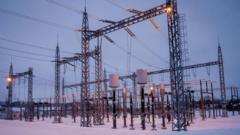In a significant move for European security, the Baltic states have disconnected from the Russian electricity grid and joined the EU network, marking the end of their energy dependency on Moscow.
Baltic States Complete Energy Independence from Russia with EU Integration

Baltic States Complete Energy Independence from Russia with EU Integration
Estonia, Latvia, and Lithuania celebrate a historic shift to the EU power grid, enhancing security and energy independence.
The Baltic nations of Estonia, Latvia, and Lithuania have officially severed their ties to Russia's electricity grid, completing a pivotal transition to the European Union's power network. This decisive action, anticipated since 2007, has been accelerated due to security concerns stemming from Russia's ongoing conflict in Ukraine, and it stands as a monumental step toward ensuring energy sovereignty for these countries.
At an event held in Lithuania's capital, key European leaders including EU chief Ursula von der Leyen characterized the moment as historic, declaring, "Today, history is made. This is freedom—freedom from threats, freedom from blackmail." The Polish President, Andrzej Duda, echoed this sentiment, describing the move as "a truly symbolic moment" that bolsters regional security and resilience. From now on, the three states will no longer rely on the Brell power grid—which stands for Belarus, Russia, Estonia, Latvia, and Lithuania—and has long been a source of vulnerability.
Despite being NATO members, the Baltic states had continued to depend indirectly on Russian energy due to their connection to the Brell grid, even as they ceased purchasing electricity from Russia since 2022. In her speech, von der Leyen acknowledged the importance of vigilance against potential Russian counteractions, especially amidst a rising wave of suspicious activities involving energy infrastructure in the region.
Recent events have raised red flags for the Baltic nations, with 11 electricity cables running under the Baltic Sea suffering damage in the past 18 months. Lithuanian President Gitanas Nauseda has called for international sanctions against Russia's "shadow fleet," which is believed to be involved in the sabotage incidents. NATO has not explicitly blamed Russia for these occurrences but is actively engaging through its newly launched Baltic Sentry patrol mission.
The ambitious energy project demanded an investment of around €1.6 billion (approximately £1.33 billion), predominantly funded by the EU. The transition took place over a two-day period, commencing with the Baltic states' disconnection from the Russian grid on Saturday and concluding with their establishment within the EU network on Sunday. Ukrainian Energy Minister German Galushchenko praised this significant milestone, deeming it beneficial for the energy landscape of the entire continent.
As they embrace their new role as a connected "energy island," the Baltic states aim to secure their energy future while reinforcing their geopolitical stance against external threats.
At an event held in Lithuania's capital, key European leaders including EU chief Ursula von der Leyen characterized the moment as historic, declaring, "Today, history is made. This is freedom—freedom from threats, freedom from blackmail." The Polish President, Andrzej Duda, echoed this sentiment, describing the move as "a truly symbolic moment" that bolsters regional security and resilience. From now on, the three states will no longer rely on the Brell power grid—which stands for Belarus, Russia, Estonia, Latvia, and Lithuania—and has long been a source of vulnerability.
Despite being NATO members, the Baltic states had continued to depend indirectly on Russian energy due to their connection to the Brell grid, even as they ceased purchasing electricity from Russia since 2022. In her speech, von der Leyen acknowledged the importance of vigilance against potential Russian counteractions, especially amidst a rising wave of suspicious activities involving energy infrastructure in the region.
Recent events have raised red flags for the Baltic nations, with 11 electricity cables running under the Baltic Sea suffering damage in the past 18 months. Lithuanian President Gitanas Nauseda has called for international sanctions against Russia's "shadow fleet," which is believed to be involved in the sabotage incidents. NATO has not explicitly blamed Russia for these occurrences but is actively engaging through its newly launched Baltic Sentry patrol mission.
The ambitious energy project demanded an investment of around €1.6 billion (approximately £1.33 billion), predominantly funded by the EU. The transition took place over a two-day period, commencing with the Baltic states' disconnection from the Russian grid on Saturday and concluding with their establishment within the EU network on Sunday. Ukrainian Energy Minister German Galushchenko praised this significant milestone, deeming it beneficial for the energy landscape of the entire continent.
As they embrace their new role as a connected "energy island," the Baltic states aim to secure their energy future while reinforcing their geopolitical stance against external threats.





















